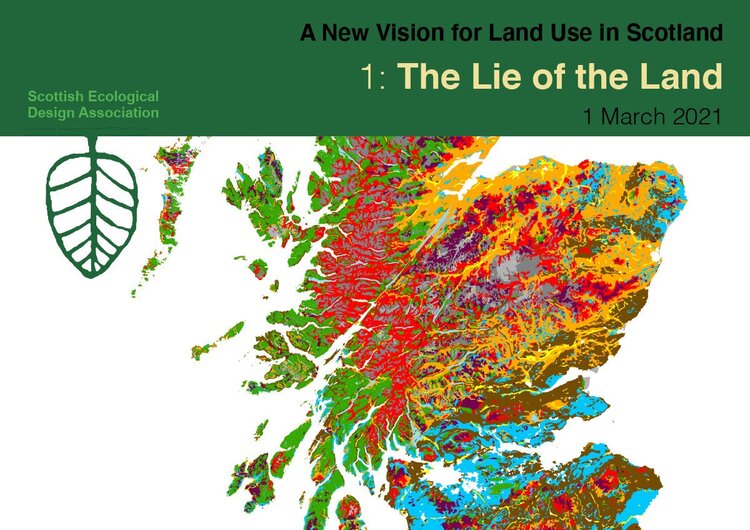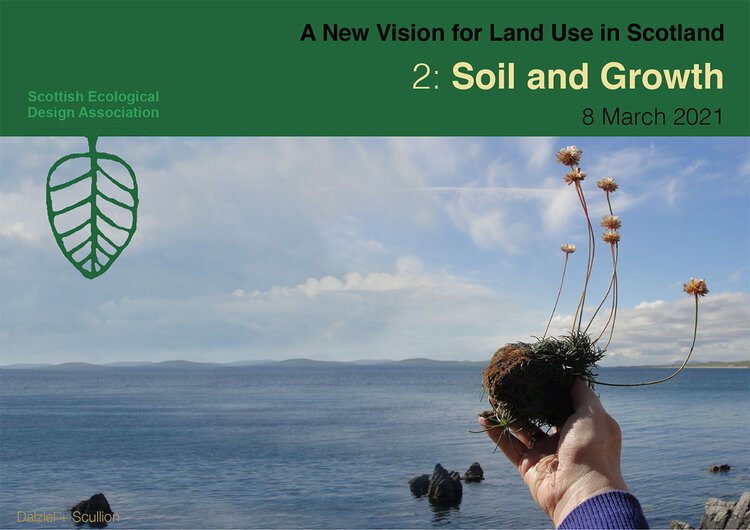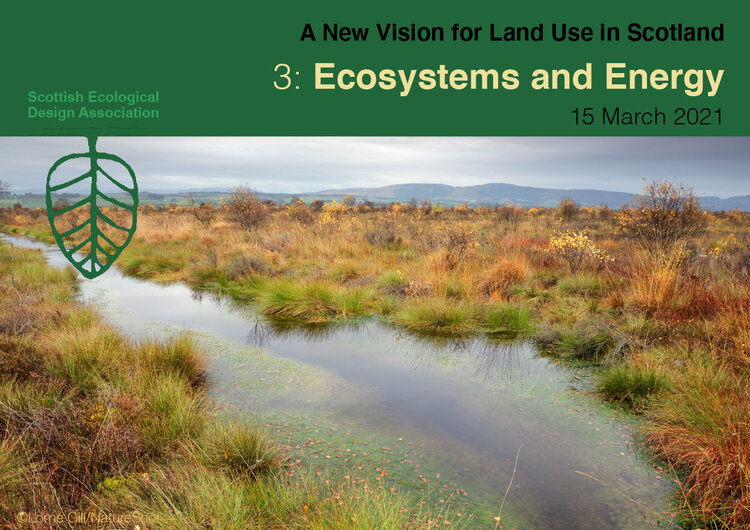A New Vision for Land Use in Scotland: Six Conversations


How do we respond to the interconnected crises of land use, climate and food security? How do we find answers to the questions of biodiversity loss and the future of the rural economy – all in the context of recovery from the pandemic? These problems are unprecedented and grave and require a different scale of innovation and collaboration. SEDA (the Scottish Ecological Design Association) is organising one of the biggest virtual events focused on land use in Scotland this Spring 2021.
The project pairs expert speakers activists and researchers to explore these issues in a series of six conversations. The speakers will include LEAF (Linking Environment And Farming) CEO Caroline Drummond, former Greenpeace scientific director Jeremy Leggett, Glasgow University economist Prof Ronald MacDonald, NatureScot CEO Francesca Osowska, Chair of Scotland’s Moorland Forum; Chair of Scotland’s Moorland Forum and MD of Ardtornish Estate Hugh Raven as well as scientists from the James Hutton Institute; academics from all of Scotland’s top universities; representatives from farming, forestry, renewable energy, tourism and landownership. But crucially also each of the days will feature contributions from a variety of musicians, poets and artists. Finally the project will end (or begin?) with an attempt to forge a A Story for the Future with Chris Dalglish, from the Institute for Heritage & Sustainable Human Development, and Creative Ethnologist Mairi MacFadyen, from Northlight.
It will also include a number of curated contributions from Scotland-based poets and musicians, intended to stimulate fresh ways of thinking, will be interspersed throughout the conversations. Musicians and artists who will participate include Hamish Napier, Pau de Planet, Su-a Lee, Chris Powici, Kirsty Law and The Poozies and Jules Horne.
SEDA Land Conversations Trailer from ScotEcoDesign on Vimeo.
This approach from SEDA to combine expert academic analysis with real-world lived experience, and to merge a scientific and an artistic and cultural approach sits within the Scottish Generalist tradition which demands the sharing of expertise and the democratisation of knowledge.




James Hutton Institute honorary scientist Geoff Squire says: “We know that building a sustainable future will need massive change across most sectors of land use and the rural economy and that change will be very difficult to achieve. This debate is essential and urgent”.


For full details of The Lie of the Land go here.
For full details of the Soil and Growth event go here.
For full details of the Ecosystems and Energy conversation go here.
For the full event programme go here for all the details.
Tickets range from £5 for unwaged/students to £12 for larger organisations with Full Series tickets are available as well at various group prices.
Bella Caledonia is delighted to be the media partner for the series and will be co-hosting content around the six conversations including articles exploring the issues in depth and collaborating to facilitate participation and debate.

WONDERFUL.
As the former Deputy Director of the Nature Conservancy (Scotland) I greatly welcome this long-overdue discussion amplified by my international experience in Africa and Canada/USA – The most relevant recent reference is the Dasgupta Review ‘The Economics of Biodiversity’ which has received international acclaim. An overarching issue is land ownership in Scotland.
James McCarthy
There was a law in ancient rome, that has now been used in Cuba. it is: “Usor Fructus”. (To the user, the fruits).
It basically means that if you are a small farmer, you get a tax break on your output, and a lease on some land. It can be “Rewilding”, forestry, smallscale agriculture (under 50 acres) or related horrticulture or market gardening. To anyone holding large amounts of land, and doing almost nothing with it, meant that the state took it from you. If this was combined with a strong anti-hunting law, (Tax it out of existance) then in 50 years, most scottish rural areas would be producing fdrom small farmers and foresters enough food for food sovereignty. (Feeding itself without importing food. This is going to become vital in the next 30 years of climate change. )
I want to see back the wilderness forests, teeming with wild life and as it should be. Small farms produce between three and four times as much as a alrger farm, by area. Green farming, forestry, and conservation, and a proper plan for rural economies and industries, can be done. Rural repopulation. Working on the4 web, from home, in a rural forest. Cooperatives. Recreating communities. Community oriented councils. It has to be done as a coherent whole. Above all, stop the damage that hunting and its cruielties have done to the eco-system and the creatures that live within it.
I presume you’re referring to ‘usufruct’; a civilian arrangement under which a person or community is allowed to exclusively use and profit from land owned by another person or community, but not to ‘abuse’ it (that is, dispose of or ‘alienate’ it through consumption, destruction, or transfer). Only the full owner has this latter right.
We already have such an arrangement in Scotland. In Scots Law, a usufruct is known as a ‘liferenter’ and has the right to receive for life the benefits of a property or other asset, without the right to dispose of that property or asset. The owner of a property ‘burdened’ by a usufruct is called the ‘fiar’ and right of ownership is known as the ‘fee’.
Legally, usufruct is a type of personal servitude. My preference would be for a system of commonwealth rather than ownership (private or public); a civilian arrangement under which none (not even the state) is allowed the right to ‘abuse’ land in the foregoing sense, and anyone who wishes to exclusively use and/or profit from it can do so in return for rent or ‘compensation’. This rent would then be distributed to the commonality in the form of a universal income.
I’m glad to see usufruct being aired there. Not to be confused with usury, it typically involves overlapping rights of usage. I’ll have the fishing rights, you the firewood, and so on. When it works well as a commons system, instead of a “tragedy of the commons” (Hardin, mostly rightly discredited), you get community between different groups of people. Religious, mythic and magical framing are often used to regulate such systems in indigenous societies.
I still have some time for Hardin (https://science.sciencemag.org/content/162/3859/1243). Basically, he argues that there’s no technical solution to the ‘tragic’ problem of growth (its unsustainability); it requires a fundamental change in the way we live. In particular, we must deny ourselves the right to ‘abuse’ the ‘land’ (in the foregoing senses), which is precisely the arrangement of usufruct.
Hardin’s mistake is that he assumes that commonality gives everyone the right to ‘abuse’ what’s held in common. It doesn’t; indeed, it all but abolishes that right altogether. It gives everyone the right to share in the use of ‘land’ and in any profit that’s generated by that use, but it gives no one the right to dispose of that ‘land’ through consumption, destruction, or transfer.
“Small farms produce between three and four times as much as a alrger farm, by area.”
Can this really be true? Having searched around a bit, ive found an article in Scientific American “According to a 1992 agricultural census report, small, diversified farms produce more than twice as much food per acre than large farms do.” Any more than that seems to depend on selection of specific crops. Even so, thats amazing, hope to hear more during these sessions!
Hi David, and thanks for the comments. Actually, it gets better. small open air farming is at least twice as efficient as big farming. If you go for agricultural polytunnels, solar heating, and grow high value crops, such as tropical veggies, you can make a living from a 10 acre (4 hectare) land and also grow in boxes potatoes, at the rate of about 25kg of spuds per box. (Tea chest size). A 100 meter by 10 meter spud polytunnel will do two crops a year, even in scotland, and grow about 25 tons plus of spuds per annum. Many other examples. Modern lighting which is very efficient can then be economical enough to grow almost anything, right through a bad Scottish winter.
The key thing, is that although Scotland exports food, it is NOT food sovereign. That means that in a future climate emergency, it might have to survive with the import of food that might not simply be there. Also, small farms can support a family, using such techniques, at a middle class standard of living. What is horrifying, is that when I did investigations into land holdings in Scotland, it was clear that huge areas were held by Feudal Oligarchs, and little or no use was made of it. A huge agricultural resource has been hi-jacked, and a lot of the land is owned “Offshore” by shady entities.
The land to the People was the main target 0f the Russian revolution. That was 100 years ago. Time to catch up. Also, trees grow about twice as fast in Scotland as they do in Finland, and reforesting means that a timber output as large as Finland’s is possible. The Scottish Goverment has simp-ly not made an effort to quantify the huge GNP loss that a green based economy on nationalised land would yield. Add to that green energy, eco-services to the general population, and you discover that Scotland has about half the economic output it could have. 10% of the population would and should be re-located on such programs. There is no reason why Scotland should not exceed the success of Ireland, which now (in the Republic) has a GNP per head that is the highest in Europe. (Yes, that really is true. It is now neck and neck with Norway, but is now slowly pulling ahead, most years. ) What I am saying here is that Scotland has what can only be called 16th Century semi-feudal land holding laws and usages. What I am also angry about, as a retired scientist, is that the geothermal potential of Scotland is at least as significant as that of the green offshore energy program. So what the hell is going on?. Scotland has excellent experts, in these areas, whose voices are not being heard. What a shame. Graham.
Bravo. Until this discussion takes place about ownership and control, we might as well be villeins .
Hi I think that we need this to be an annual event.
2023 is close. We only get this one chance, and the “Usual Suspects” will take steps to neutralise this.
Graham
This is brilliant – BUT – you do need to clarify your “call to action” – what do I need to do to participate in ALL of this ? I would sign up to it -how ?
Go here to sign up for the first:
https://www.seda.uk.net/the-lie-of-the-land
and you can buy
Dear Geoff,
As Mao said: “Every journey begins with but a single step.”
Thats what the conference might be about.
Critical is the participation and support of Scottish parliamentarians, opinion formers, and activists.
My personal belief is that active attempts will be made to belittle and dismiss the project. Too many Oligarchs in Scotland, and not enough peasants.
@Graham
Wiz it no Lao Tzu that said that?
Anyways, excellent stuff, and looking forwird tae it.
Onwards.
No, it couldn’t have been Laozi. The historicity of the person known as ‘Laozi’ (which isn’t actually a personal name but only an honorific title – ‘Old Master’) is doubtful and he Dao De Jing is likely to be ‘a compilation of sayings by many tongues’.
The proverb is recorded in the Dao De Jing, though. The Chinese People’s Liberation Army also included it in its Treasured Red Book – Quotations from Chairman Mao Zedong, which was instrumental in the deification of Mao and the forced imposition of the Maoist cultus as the state religion in China.
In 1973, I famously liberated a copy of the Treasured Red Book from the school library and burned it in the playground.
I think there’s some more detail to come out about how this rolls out and connects. For example SEDA say:
“One goal is to feed into the Scottish Government’s programme of creating Regional Land Use Frameworks by 2023 – a coherent programme of land reform to maximise the potential of Scotland’s land in tackling climate change.”
And this is the full info page where you can pick between any of the six events, or get tickets for the Fill Series if you want to sit in on the lot.
https://www.seda.uk.net/land-conversations
What is needed is that there is a clear realisation that high tech and green tech can be joined up. Re-distributing the land into small holdings on public lease would at the very basic level lead to rural repopulation. (If there are no people, there is no farming.) The Lairds and Oligrachs are ruining Scoltland, with their still existing Fuedal system. All these issues were debated and dealt with, in Mexico in 1910, when the Revolution hit the rural areas like an earthquake. Its why Mexican rural families have a reasonable life. What Scotland needs, is a sort of radicalised, ” Semi-middle class Digital Peasantry” that lives on the land becuase they are “Eco”, believe in it, and willing to try to change things. This is fundemental. Think in terms of a reversal of the so-called “Clearances”. which were a brutal and evil deliberate destruction of the Highland Tribes, their language, culture, and hearts. Its called Genocide, when this sort of thing happens. It happened in ireland. The word “Clans” is full of romanticism and mystique. Say TRIBES instead. It is a lot closer to the truth. What was done to them was a horror. At that time, the same thing was done in Ireland. A Scottish version of the “White Settler” program in Kenya was forced on the natives. It was Imperial british policy. All of this has to be faced. It has been done in Wales. About half the Welsh children graduating from School are now bilingual, fluent in Welsh, and well aware of its past treatment by the london Goverment. The goal is to have three quarters of the population fluent speakers within another 20 years. So do not tell me that it can be done. it has been done. Trees, Gaelic, small family farms, are all possible. So is the development and recovery of old Scottish culture, in new forms. As the venerable Welsh language Spociety, whose peaceful campaigns for language rights led to jail terms, said: “When the native Welsh, cannot even speak their own language, and are forced into the speech of those who conquered them, Wales cannot prosper, as they literally have no words to say what has happened to them. Please read Franz Fanons book, “Black Skins, white masks.”. all of this has to be integrated and advanced as a whole, on a broad front. At the moment I cannot see any signs of land reform being done by the SNP. Quite the opposite. They have made lip service to reforms, but still have a cultural cringe in the leadership.